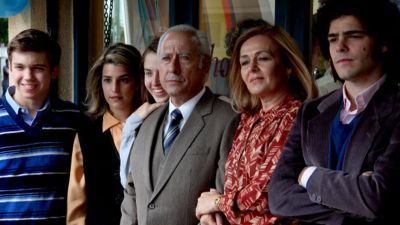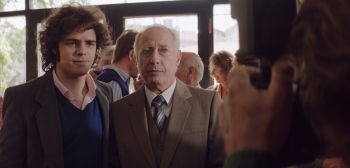
By Elias Savada.
An ugly, dirty war begets the airing of some nasty laundry. That’s the simple historical concept – and quite an emotional memory for the too many South Americans who suffered through the bad times – driving millions of fascinated fans to Pablo Trapero’s new feature The Clan (El Clan), Argentina’s official submission for 2015’s foreign-language Oscar. It’s also the most successful local production ever at its domestic box office. President Obama’s recent visit to that country happened on the 40th anniversary of the start of seven-year genocidal dirty war, not a great public relations coup. It was during 1976-1983 that Argentina’s military dictatorship condoned the “disappearance” of tens of thousands of its citizens, originally targeting the junta’s left-wing political opponents before morphing into money-grabbing abductions of its wealthier citizens.
That era’s infamy is revealed anew in this based-on-a-true-story tale, set in 1983, about the Puccio family, a relaxed, middle-class brood lead by soft-spoken patriarch Arquímedes (Guillermo Francella). The versatile Francella plays his character with an icy aloofness, as a proud but emotionally-vacant eunuch. He couldn’t be any spookier unless he was a full albino. The white hair. The pale skin. The light eyes. He’s nearly there.
What makes the film most unsettling is the family’s immoral compass, with its needle pointing straight to Hell. As counterpoint, the deliberately paced narrative plays out like a bland soap opera. They tackle such everyday issues as home work (the kids – two boys, two girls, another absent son), grading exams (the mom), wishful travel plans (son Alejandro “Alex” Puccio, a rising rugby celebrity). Sure, dad puts food on the table, chit chats with his wife, and builds a plate of food for another guest in the house, one who has been captured by Arquímedes and his small criminal entourage. The collected physical abuse and vocal agonies that emerge from this parade of visitors will unnerve the audience.
Not all the kids are happy with dad’s aggressive line of work, especially reluctant son Alex (Peter Lanzani, looking like one of TV’s missing Monkees – he’s a tv star and member of the popular band “Teen Angels” – making his film debut). The children, in various stages of maturity, turn their angst inward. And who could they turn to, if they would or could? Arquímedes has a direct line to “The Commodore,” and others in government power. The military politicos rarely interfere with Arquímedes’ kidnappings or murders.
 Trapero’s script paints a most stressful father-family relationship (with mom silently but wholeheartedly on dad’s side), mostly set in the year democracy was restored with the election of Raúl Algonín as president. Times seem to be a-changin’. Trapero’s slow-moving direction occasionally pushes scenes out of temporal order, the better to unsettle with a little puzzle work that will be solved by the picture’s end. He has a frequency to intercut complicated sequences from separate story lines, not very effectively. In one case, Alex having car sex with a new girlfriend, while dad is phoning in a ransom demand. But the film’s major strength is in Francella’s troubling performance as a black-hearted Robin Hood. Even family friends (one is a teammate of Alex) aren’t immune. And his glib demeanor when dealing with the families he is harming plays out like a forceful but level-headed negotiated contract.
Trapero’s script paints a most stressful father-family relationship (with mom silently but wholeheartedly on dad’s side), mostly set in the year democracy was restored with the election of Raúl Algonín as president. Times seem to be a-changin’. Trapero’s slow-moving direction occasionally pushes scenes out of temporal order, the better to unsettle with a little puzzle work that will be solved by the picture’s end. He has a frequency to intercut complicated sequences from separate story lines, not very effectively. In one case, Alex having car sex with a new girlfriend, while dad is phoning in a ransom demand. But the film’s major strength is in Francella’s troubling performance as a black-hearted Robin Hood. Even family friends (one is a teammate of Alex) aren’t immune. And his glib demeanor when dealing with the families he is harming plays out like a forceful but level-headed negotiated contract.
No doubt a Sisyphean salute to Argentina’s notorious past, the film borrows some of its discordant, violent associations from the playbook of Martin Scorsese, including the selection of extended rock songs from such bands as The Kinks and Creedence Clearwater Revival, some from the period, others not. Only those knowledgeable that all music was banned in Argentina at the time brings up Trapero’s ironic soundtrack layer. Even for those not familiar with the period and and the place, The Clan is still a very entertaining film. The hard part might be deciding which members of your family to bring along to the art house playing it. Those that go, give them a good hug when its over.
Elias Savada is a movie copyright researcher, critic, craft beer geek, and avid genealogist based in Bethesda, Maryland. He helps program the Spooky Movie International Movie Film Festival, and previously reviewed for Film Threat and Nitrate Online. He is an executive producer of the new horror film German Angst and co-author, with David J. Skal, of Dark Carnival: the Secret World of Tod Browning.
